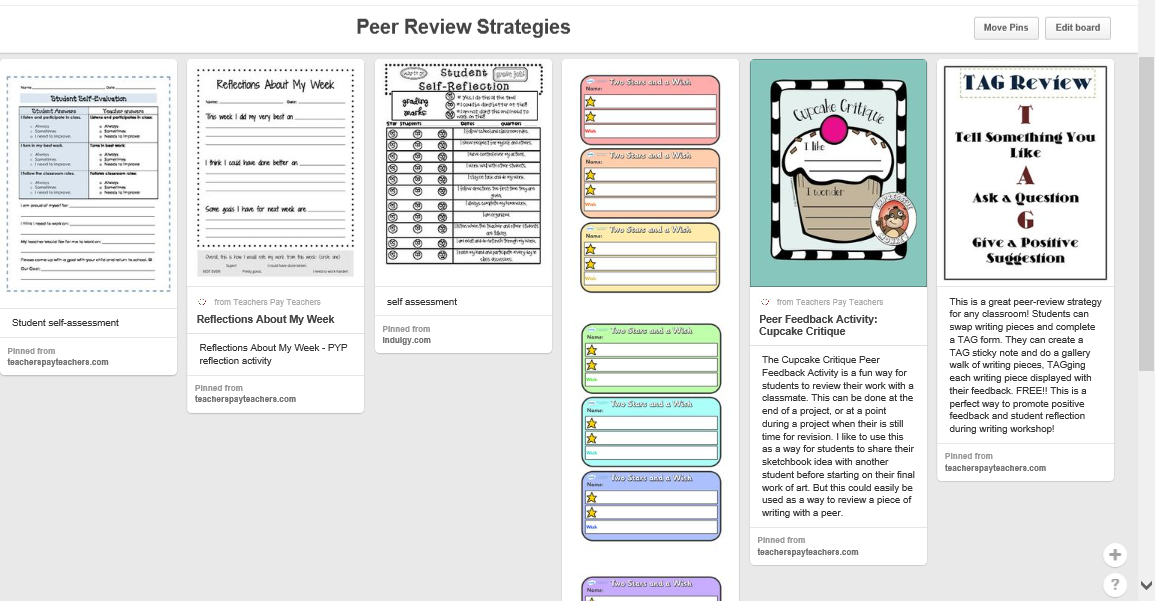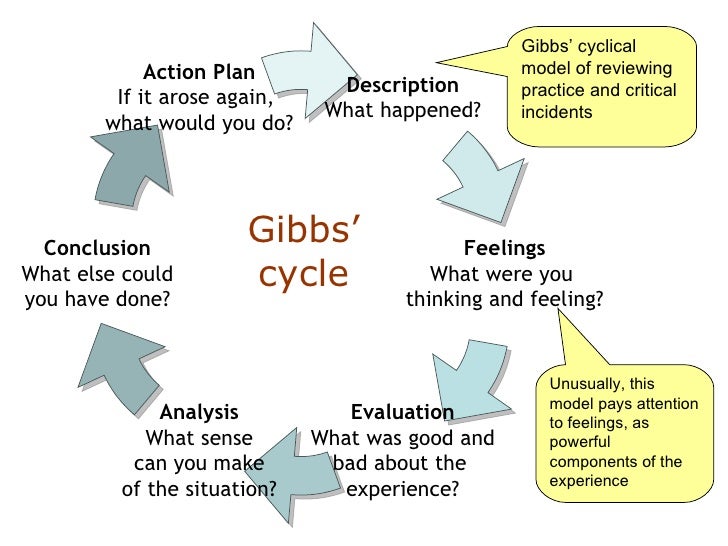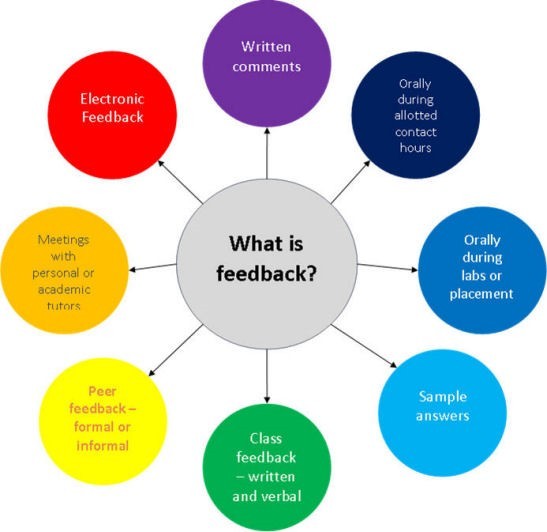Pinterest is such a fantastic resource for teachers. It is so easy to use and is full of great ideas. I have started a new board on my account where I have saved some peer review strategy ideas. I will continue to use this board over the period of my course, so hopefully by the time it comes to me having to use peer review strategies in the classroom, I will have this as a reference to go to for ideas and inspiration. 
Category Archives: 3.3 Pupil Assessment
Peer Review and Feedback
Before we do anything here, we need to understand what feedback is to be able to give feedback to others. Simply, as Google states, it is information which is used as a origin for development and improvement. It has a very meaningful purpose to it, yet provide us with many benefits and challenges.
Below is a diagram to describe the different forms that we can receive feedback in.
http://learning.cf.ac.uk/examples-of-feedback/#peer
Peer review has a very meaningful purpose. Through self-assessment it activates us as students, as learners of our own learning. Through peer assessment it activates students as teaching resources for one another. It puts the people/individual giving feedback at an advantage, alongside the people receiving it.
Receiving feedback helps develop key skills, such as critical thinking and reflection, communication, self-motivation and time management. It also allows us to be able to give constructive feedback to others, therefore helping them improve. If we engage with peer review, we are also engaging with assessment criteria which leads to improved application of our own work. We get a richer understanding of our own work.
On the other hand is the challenges of peer review. Reluctance of one or more to partake in the process can be a barrier to effective results. Some people, especially young children, may have a dislike to assessing or judging their friends. Others may not get on with other people taking part in the peer review process, which is an issue. In general peer review is very time consuming, therefore a lot of teachers, for example, may have 101 other things to do and simply doesn’t have the time to sit and do a thorough assessment. Finally, if people lack evaluative skills them this can cause a lot of problems.
Next, we need to understand how to give useful criticism. By understanding what ineffective feedback is, it allows us to understand what effective feedback consists of.
Below, is an interesting video I found on YouTube that brings up some points that I hadn’t thought about whilst looking into peer review.
The woman in the video has used the bird house as an example. She feels that there is so many things that the pupil could improve on from the bird house, that she suggests giving feedback to them in parts: one thing at a time. I feel that this is a really good idea. If a teacher bombards you with loads and loads or corrections to do on your work, you are going to be clueless as to where to start. However, if each correction is pointed out to you gradually, it allows you to fully focus on improving from the feedback that is given, without having to worry about all the other mistakes that you’ve made.
Another issue that was raised in this video was resubmission. I feel that this is really important to be able to hand something in a second, third, even fourth time! I know from my own school experience that if a teacher hands you back a piece of writing with all the corrections that you should do to improve your work , but they are never going to look at it again, then your initial thought is why bother doing the corrections if I don’t really have to?
I remember throughout my time in high school studying Higher English, my teacher got to the point where she would just expect another draft of my essay in each day to go into my folio. I must have handed in about eight copies of the same essay to her (I’m pretty sure she got sick of me and ended up just telling me that it was really good after the eighth copy). But, I wanted to keep receiving constant feedback from her to help me improve my work to get it to the highest standard I could possibly achieve. After all, it must have worked as I got my B in Higher English and here I am studying Education at the University of Dundee! To me, this is proof that effective feedback is definitely beneficial.
Most of all, I am delighted to see people actually taking the time to read my work on my ePortfolio and give their opinion on it. I really value what people are saying. Receiving feedback on my work was definitely a positive experience for me, even though it contained good points about it and points that I could improve on. It is a confidence booster to read the good points that people are making about my work. I sometimes write posts for my ePortfolio and wonder “am I doing this right?” but from the comments I am receiving from my peers, it most definitely implies to me that I am doing something right!
From leaving other people comments on their work, I have learned the basic things to look out for when assessing, such as spelling, grammar, and identifying whether or not they are following the learning criteria. Also, I’ve learned how to be critical. At first, I didn’t want to mention things that people should improve on because I didn’t want to feel like I was being picky or nasty. Often this can be a barrier to leaving feedback to others. Now after receiving comments from peers about how I could improve my work, I have realised it isn’t nasty or picky at all. It is actually really helpful and important.
I feel that as I go through my course at University I should be engaging with other people’s work on ePortfolio and leaving constructive criticism in the comments as this will really help both the student and I. The student will gain a deeper understanding of their work and I will develop skills which I can use in the classroom.
Pupils need feedback on their work in the classroom – it is really important. We learn and develop from receiving feedback, therefore it is crucial for children to be presented with critical comments upon which they can improve. Not only will they understand where they are going wrong and be able to prevent it happening again, but will it allow for them to become more critical by seeing good examples of criticism. They will understand what it is to give feedback, and how to do it. There are lots of resources that can be used in the classroom to get children self and peer assessing. I will show examples of strategies that can be used in the classroom to get everybody thinking about peer review in my next post.
Constructive criticism and peer review is the way forward!
What is the point in reflecting?
Through the online unit, I have learnt so much about reflection. Reflective writing was never something I was good at throughout school. I didn’t really do any more than describe the event and talk about my thoughts and feeling at the time. I now realise that there is a lot more to reflection, and had I known this at the time my work would have significantly improved.
Reflection is an action in learning. It is an activity that provides us with proof that we have stood back from an event, been able to be critical of ourselves and our work, and even see things from someone else’s point of view. Reflection is taking things a step further than simply describing your thoughts and feelings.
Why reflect?
I’ve discovered through doing the online unit that there are many reasons why it is beneficial to reflect. Reflection gives us the chance to gain a lot more knowledge on our work, and deepen our understanding. We can consider the way in which we learn. If we reflect, and evaluate our work, we can create a plan of action for the next time: how will we deal with this if it happens again? What would I do better next time?
To me, reflection means looking back. So far in my course, I have taken notes during lectures and then reflected on them at night: looked back on my notes. If I don’t understand something, I simply research it to ensure I do know what it means for future reference. Reflection allows us to resolve uncertainty. It allows us to empower ourselves as individual people. When you reflect on something, I think you get a sense of purpose. You feel like what you have done is worth doing, because you’ve taken more from it than the simple knowledge.
The ability to be critical of yourself is crucial in life. If you have this skill you will constantly be learning and growing. You are able to consider what you have done, and know how to improve. Reflection helps to develop this important life skill, hence why it is important to constantly reflect on your work.
‘It is not sufficient simply to have an experience in order to learn. Without reflecting upon this experience it may quickly be forgotten, or its learning potential lost. It is from the feelings and thoughts emerging from this reflection that generalisations or concepts can be generated. And it is generalisations that allow new situations to be tackled effectively.’ (Gibbs 1988)
In Learning by Doing, Gibbs (1988) outlines the stages for a ‘Structured Debriefing’, which are based on Kolb’s (1984) Experiential Learning Cycle and which encourage deeper reflection. This includes:
| Description | What is the stimulant for reflection? ( incident, event, theoretical idea ) What are you going to reflect on? |
| Feelings | What were your reactions and feelings? |
| Evaluation | What was good and bad about the experience? Make value judgements. |
| Analysis | What sense can you make of the situation? Bring in ideas from outside the experience to help you. What was really going on? |
| Conclusion (general) | What can be concluded, in a general sense, from these experiences and the analyses you have undertaken? |
| Conclusion (specific) | What can be concluded about your own specific, unique, personal situation or ways of working? |
| Personal action plans | What are you going to do differently in this type of situation next time? What steps are you going to take on the basis of what you have learnt? |
The above evidence shows us how to successfully and fully reflect on something. If we go through each stage above and answer it according to our work or experience, we can get the most we possibly can out of reflection. From the online unit about reflection, this piece of information has been the most helpful resource to me. I feel this model explains reflection really well, and shows me exactly how to self-evaluate anything I’ve done. I feel it is very thorough and anyone who is to follow this should get a really positive outcome.

From personal experience, I already feel myself questioning everything I do. I am evaluating myself, and my work more often and I feel like it is really helping me to understand why I do what I do. Reflection is really important and I feel that it is crucial that everybody does it. It helps us to go through life with an real understanding for everything.
Reflection is definitely something I want to include in the classroom in the future. I think it is really important for young children to look at what they’ve done. If they see the things they’ve done well it will have a definite improvement on their confidence. Similarly, if they see the things they haven’t done so well in, they’ll understand what they need to do to improve. A regular time set aside for reflection would be really beneficial in the classroom. Not only does it allow for the teacher to track how pupils are doing, but do the children get to see how they’re progressing themselves. If they start this at primary school age, they are guaranteed to be able to go on through life using constructive criticism—a skill that they’ll definitely need!




